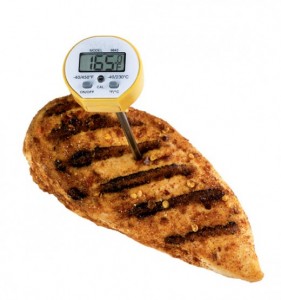 Some people don’t take food poisoning very seriously. Maybe that’s because the symptoms usually are not long-lasting in most healthy people—a few hours or a few days—and usually go away without medical treatment. But foodborne illness can be severe, even life-threatening to anyone, especially those most at risk such as older adults, infants and young children, pregnant women, and people with HIV/AIDS, cancer, or any condition that weakens their immune systems.
Some people don’t take food poisoning very seriously. Maybe that’s because the symptoms usually are not long-lasting in most healthy people—a few hours or a few days—and usually go away without medical treatment. But foodborne illness can be severe, even life-threatening to anyone, especially those most at risk such as older adults, infants and young children, pregnant women, and people with HIV/AIDS, cancer, or any condition that weakens their immune systems.
Threats to food safety constantly evolve. New disease-causing organisms emerge and known pathogens become more virulent. In addition, consumers increasingly want food that is less processed. Even though government food safety regulators received important new tools to help protect us in the 2011 Food Safety Modernization Act, it’s clear that individuals need to take every practical step they can to prevent foodborne illness.
Since it’s traditional at the start of a new year to think about what needs to be changed in one’s life to make it happier and healthier, here are a few suggestions for resolutions to help eliminate foodborne illness from your and your families’ lives.
 Clean: Resolve to wash your hands before, during and after handling food. According to the Centers for Disease Control and Prevention (CDC), handwashing has the potential to save more lives than any single vaccine or medical intervention. To do it effectively, wet your hands with clean running water (warm or cold) and apply soap. Rub your hands together to make a lather and scrub them well for at least 20 seconds. Air dry or use a clean paper towel.
Clean: Resolve to wash your hands before, during and after handling food. According to the Centers for Disease Control and Prevention (CDC), handwashing has the potential to save more lives than any single vaccine or medical intervention. To do it effectively, wet your hands with clean running water (warm or cold) and apply soap. Rub your hands together to make a lather and scrub them well for at least 20 seconds. Air dry or use a clean paper towel.
Separate: If you only have one cutting board, resolve to get another to help avoid cross-contamination. Use one for foods that will be cooked, such as meat, poultry, and seafood, and the other for foods like fruits and vegetables that will be eaten raw. That way the raw foods won’t be contaminated by the juices from the ones to be cooked. If you do get a new cutting board, get one that’s dishwasher-safe. The very hot water and strong detergent typically used in dishwashers can eliminate a lot of bacteria.
 Cook: Resolve to get a food thermometer, if you don’t have one. Only a food thermometer can make sure meat, poultry, fish, and casseroles are cooked to a safe internal temperature—hot enough to kill any pathogens that may be present.
Cook: Resolve to get a food thermometer, if you don’t have one. Only a food thermometer can make sure meat, poultry, fish, and casseroles are cooked to a safe internal temperature—hot enough to kill any pathogens that may be present.
Chill: Similarly, resolve to get an appliance thermometer to be sure your refrigerator is at or below 40ºF. Between 40ºF and 140ºF is the Danger Zone when bacteria multiply rapidly. The more bacteria, the more likely someone will get sick. Most refrigerators have just a colder/warmer adjustment, so the only way to know the temperature is to put a thermometer inside.
For more information, check out these resources:
Long-Term Effects of Food Poisoning

Comments